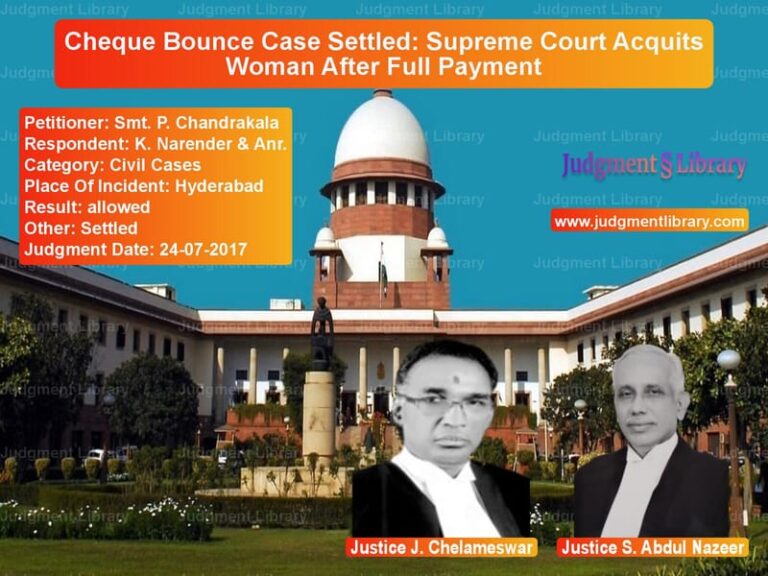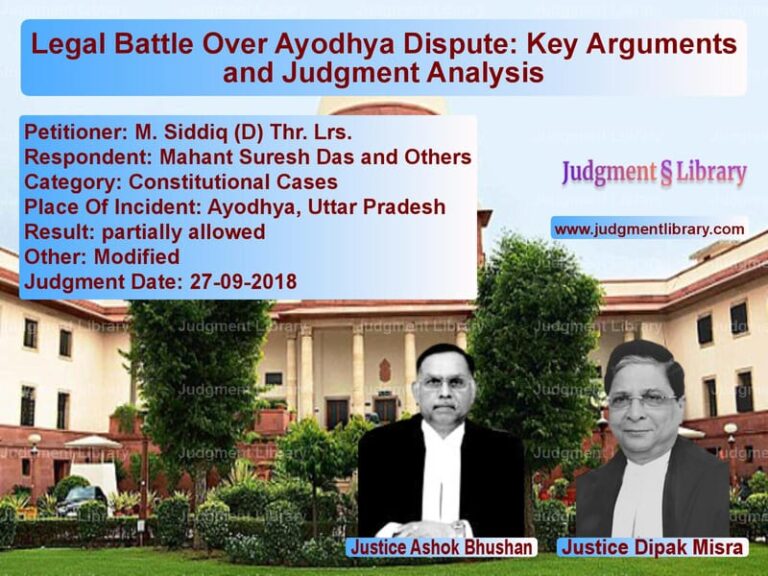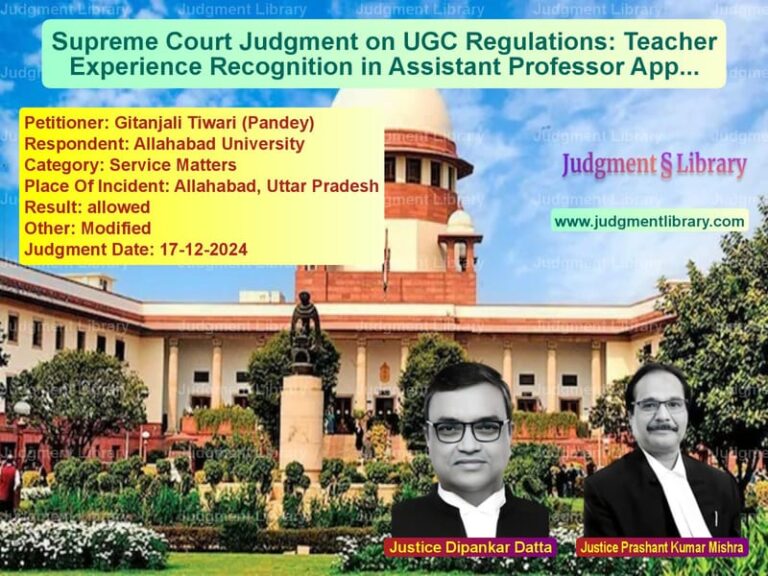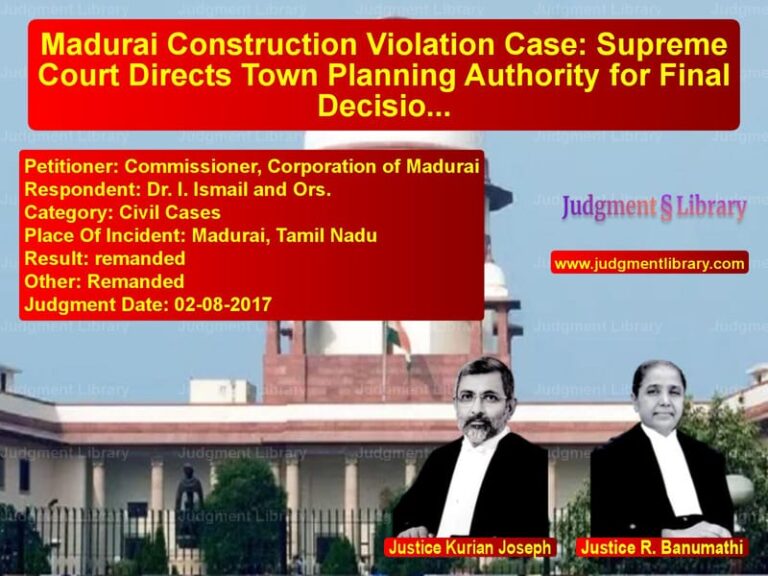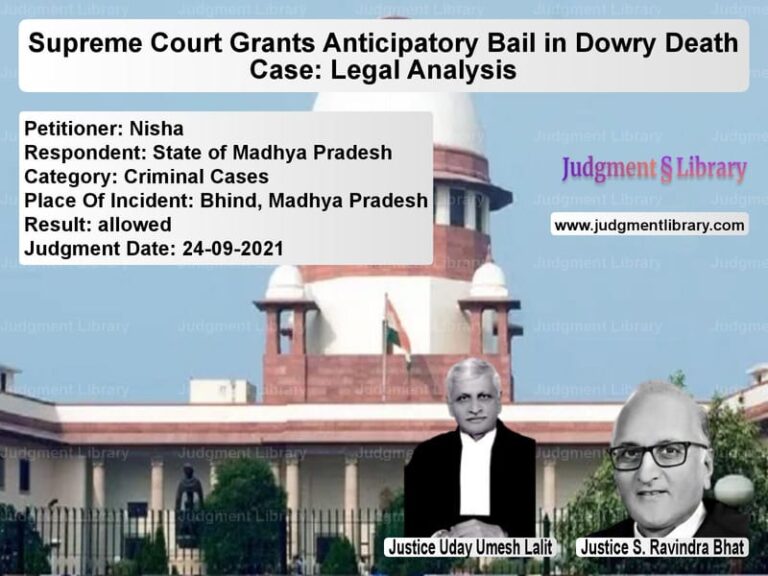Supreme Court Rules on Land Allotment Dispute Between Noida Authority and Promotional Club
The Supreme Court of India, in Ritu Maheshwari v. M/S Promotional Club, delivered a significant judgment addressing land allotment disputes between the Noida Authority and an industrial applicant. The case primarily revolved around whether Noida Authority’s closure of an industrial plot allotment scheme in 2012 was lawful and whether the respondent, M/S Promotional Club, had any enforceable right to claim allotment of a plot under the closed scheme.
The ruling clarified the legal standing of applicants in government schemes and emphasized that a mere application for land allotment does not confer a vested right to claim the land. The judgment also provided key observations on procedural fairness, judicial discretion in administrative decisions, and the consequences of suppressing material facts in court proceedings.
Background of the Case
The dispute originated from an industrial land allotment scheme announced by the Noida Authority in 2010 (the ‘old scheme’). This scheme invited applications for plots larger than 2000 square meters in Phases II and III of the industrial area in Noida. Under the scheme:
- Applicants were required to pay a registration fee and submit a project report along with their applications.
- The allotment was to be done based on interviews conducted by a screening committee.
- The Noida Authority reserved the right to close the scheme at any time without prior notice.
M/S Promotional Club applied for two industrial plots under this scheme and fulfilled all application requirements. However, before its applications could be processed, the Noida Authority decided to close the scheme on July 5, 2012, citing feasibility concerns. The closure was publicly announced on July 12, 2012.
Aggrieved by this decision, Promotional Club filed a writ petition before the Allahabad High Court, arguing that Noida’s decision was arbitrary and unfair, as it had considered applications from other applicants while ignoring the club’s application.
Arguments by the Appellant (Noida Authority)
The Noida Authority, represented by Senior Counsel K.V. Vishwanathan, put forward the following arguments:
- The old scheme was lawfully closed, and all applicants were informed about the decision in a transparent manner.
- Once the scheme was discontinued, Promotional Club had no enforceable right to claim land under it.
- The High Court erred in assuming that Noida had available plots under the old scheme, as all unallotted plots were reallocated in subsequent schemes.
- The club applied under a new scheme in 2013 and was allotted a plot of 4000 square meters, which it partially paid for.
- The club’s suppression of this fact before the High Court amounted to a material misrepresentation, making it ineligible for any relief.
Arguments by the Respondent (M/S Promotional Club)
The respondent, M/S Promotional Club, represented by Senior Counsel Salman Khurshid, contended:
- Noida arbitrarily rejected its applications without even considering them for allotment.
- The club met all eligibility requirements and should have been called for an interview, just like other applicants.
- Since some plots remained unallotted, the club’s applications should have been reconsidered.
- The fact that Noida launched a new scheme in 2013 should not affect its claim under the earlier scheme.
- There was no legal obligation to disclose the allotment under the new scheme, as it was separate from the old scheme.
Supreme Court’s Observations
The Bench, comprising Justices Uday Umesh Lalit, S. Ravindra Bhat, and P.S. Narasimha, examined the case and made the following key observations:
- A mere application for land allotment does not create a vested right for the applicant.
- Noida had explicitly reserved the right to close the scheme at any time, and this was a known condition to all applicants.
- Since Promotional Club did not challenge the closure of the scheme itself, it could not later claim entitlement to land under it.
- Administrative authorities have the discretion to close schemes based on feasibility assessments, and courts should not interfere unless there is evidence of mala fide intent.
- The club had an obligation to disclose its subsequent allotment under the 2013 scheme, as it was a material fact relevant to the court’s decision.
- The High Court overstepped its jurisdiction by directing Noida to reconsider the club’s applications when the scheme itself had been lawfully closed.
Key Judicial Precedents Referred
The Supreme Court relied on multiple past judgments to reinforce its reasoning, including:
- Delhi Development Authority v. Pushpendra Kumar Jain (1994): Held that the mere selection of an applicant does not create an absolute right to allotment.
- The Bihar State Housing Board v. Radha Ballabh Health Care (2019): Clarified that responding to an advertisement does not create an obligation for authorities to allot land.
- Howrah Municipal Corporation v. Ganges Rope Co. Ltd. (2003): Stated that applications must be considered under the rules prevailing at the time of decision-making, not under earlier policies.
- Usman Gani Khatri v. Cantonment Board (1992): Affirmed that new rules apply when considering applications, and old policies cannot be insisted upon by applicants.
Final Judgment
The Supreme Court ruled in favor of the Noida Authority and set aside the Allahabad High Court’s judgment. The key points of the ruling were:
- Noida’s decision to close the old scheme was lawful, and the club had no claim under it.
- The High Court erred in directing Noida to reconsider the applications under a non-existent scheme.
- Land applicants cannot insist on allotment based on outdated schemes once a new policy is in place.
- The club’s suppression of material facts regarding its allotment under the 2013 scheme was a serious lapse and made it ineligible for equitable relief.
Implications of the Judgment
This ruling has important implications for land allotment disputes and administrative decision-making:
- Applicants under government schemes cannot claim vested rights to land merely by applying.
- Authorities have the discretion to close or modify schemes, provided due process is followed.
- Subsequent purchasers or applicants cannot challenge policy changes that affect earlier schemes.
- Failure to disclose material facts can result in denial of relief in writ petitions.
The judgment reinforces the principle that courts should not interfere in administrative decisions unless clear arbitrariness or mala fide intent is demonstrated. It also serves as a cautionary precedent for land applicants, emphasizing the importance of transparency and procedural compliance when seeking judicial relief.
Petitioner Name: Ritu Maheshwari.Respondent Name: M/S Promotional Club.Judgment By: Justice Uday Umesh Lalit, Justice S. Ravindra Bhat, Justice P.S. Narasimha.Place Of Incident: Noida.Judgment Date: 05-05-2022.
Don’t miss out on the full details! Download the complete judgment in PDF format below and gain valuable insights instantly!
Download Judgment: ritu-maheshwari-vs-ms-promotional-club-supreme-court-of-india-judgment-dated-05-05-2022.pdf
Directly Download Judgment: Directly download this Judgment
See all petitions in Property Disputes
See all petitions in Contract Disputes
See all petitions in Public Interest Litigation
See all petitions in Damages and Compensation
See all petitions in Other Cases
See all petitions in Judgment by Uday Umesh Lalit
See all petitions in Judgment by S Ravindra Bhat
See all petitions in Judgment by P.S. Narasimha
See all petitions in allowed
See all petitions in Quashed
See all petitions in supreme court of India judgments May 2022
See all petitions in 2022 judgments
See all posts in Civil Cases Category
See all allowed petitions in Civil Cases Category
See all Dismissed petitions in Civil Cases Category
See all partially allowed petitions in Civil Cases Category


